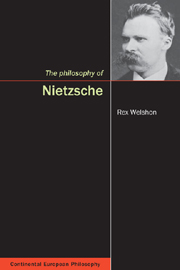3 - Nihilism
Summary
Nietzsche is a self-professed nihilist, although, if we are to believe him, it took him until 1887 to admit it (he makes the admission in a Nachlass note from that year). No philosopher's nihilism is more radical than Nietzsche's and only Kierkegaard's and Sartre's are as radical. Nietzsche's nihilism is certainly more radical than the theatrical nihilisms paraded around for public consumption by the terminally hip. Compared to Nietzsche, such nihilists are flimsy poseurs. Although they may espouse a morose detachment from bourgeois society and flaunt their anxiety about political and moral legitimacy, and although they may recognize that moral values are shot through with inconsistency and hypocrisy, none of them understand, as does Nietzsche, the conceptual connections between various components of the Western tradition and nihilism, and none of them undertake to analyse the philosophical assumptions of their detachment and anxiety. Nietzsche's nihilism, on the other hand, is thorough and existentially committing; he rejects as meaningless most Western philosophical and theological traditions and condemns European culture as decadent and devoid of content. Surprisingly, however, we look in vain in his work for despair in the face of the loss of meaning; in fact, Nietzsche celebrates it. It will take us the remainder of this book to unpack his reasons for doing so.
Nietzsche's nihilism is complicated by the fact that it is double-edged, even triple-edged. Not only does he think that the Western philosophical tradition, science, religion generally and Christianity in particular are wrong, but he also accuses them of being internally nihilistic.
- Type
- Chapter
- Information
- The Philosophy of Nietzsche , pp. 57 - 74Publisher: Acumen PublishingPrint publication year: 2004

